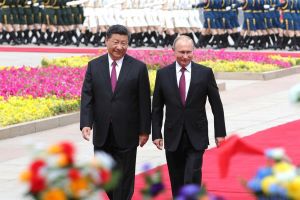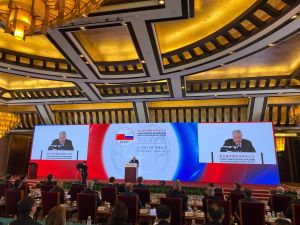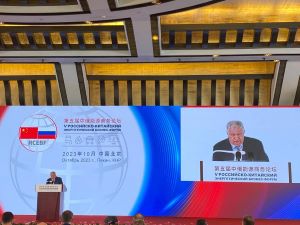Please activate JavaScript in your browser to use all interface options.
The fifth Russian-Chinese Energy Business Forum begins in Beijing
19 October 2023-350x1000.jpg)
The fifth Russian-Chinese Energy Business Forum (RCEBF) was opened on Tuesday in Beijing, the capital of the People's Republic of China.
This event has been taking place every year since 2018 in accordance with agreements between Russian President Vladimir Putin and Chinese President Xi Jinping. The Forum is held under the auspices of the Russian Presidential Commission for Fuel and Energy Complex Development Strategy and Environmental Safety and the National Energy Administration of the People's Republic of China, co-organized by Rosneft and China National Petroleum Corporation (CNPC).
The Forum opening ceremony was attended by Ding Xuexiang, First Vice Premier of the People's Republic of China, Igor Sechin, Executive Secretary of the Presidential Commission for Strategic Development of the Fuel and Energy Sector and Environmental Security, Chief Executive Officer of Rosneft, Aleksandr Novak, Deputy Prime Minister of the Russian Federation, and Dai Houliang, Chairman of the Board of Directors of China National Petroleum Corporation.
 Russian President Vladimir Putin and Chinese President Xi Jinping sent their greetings to the Forum participants.
Russian President Vladimir Putin and Chinese President Xi Jinping sent their greetings to the Forum participants.
Russian President’s greeting address was presented by Igor Sechin. In his greeting Vladimir Putin noted that the relations of comprehensive partnership and strategic cooperation between Russia and China have reached an unprecedented high level and continue to develop dynamically. One of the key components of these relations is energy cooperation, which is becoming increasingly active and multidimensional.
According to the head of state, the Russian-Chinese Energy Business Forum plays a significant role in promoting mutually beneficial cooperation and provides for a direct constructive dialog between representatives of the respective government agencies, business and expert communities of the two countries.
 After this Igor Sechin made a speech, in which he outlined his views on the current status as well as prospects of the Russian-Chinese cooperation development.
After this Igor Sechin made a speech, in which he outlined his views on the current status as well as prospects of the Russian-Chinese cooperation development.
Russia aims to strengthen and deepen cooperation with the Chinese side along the entire value creation chain in the energy sector and related fields, including technologies, equipment supplies and financing of projects. "I am confident that our cooperation has a huge potential, and we are in the very beginning of its implementation," added Mr. Sechin.
"Cooperation between Russia and China is strengthening in all areas. The total trade turnover between our countries over the past five years has grown to 660 billion dollars," said Igor Sechin. According to him, at the end of 8 months of 2023, Russia became the main oil supplier for China and is ahead of Saudi Arabia. More than 75 million tons of Russian oil have already been delivered to China this year, which is 25% more than last year.
 This year's event is attended by about 500 participants, including political figures, representatives of more than 100 major Russian and Chinese companies from various industries, scientists, academics, experts and analysts.
This year's event is attended by about 500 participants, including political figures, representatives of more than 100 major Russian and Chinese companies from various industries, scientists, academics, experts and analysts.
The RCEBF events will last for two days. The first day will feature sessions on deepening of Russian-Chinese energy cooperation, contributing to the energy transition, and formatting new regional centers of influence and centers of knowledge. The first day's program includes two technology tours for the Forum participants: CNPC will arrange a visit to its Engineering and Construction Institute, and China Energy Investment Corporation - to the National Institute of Clean-and-Low-Carbon Energy.
On Friday, three roundtables will be held at the RCEBF to discuss digital nuclear power, high-tech coal mining, as well as energy security and energy transition. 
GREETING BY THE PRESIDENT OF THE RUSSIAN FEDERATION
To the participants, organizers and guests of the 5th Russian-Chinese Energy Business Forum
Dear friends, I welcome you on the occasion of the opening of the 5th Russian-Chinese Energy Business Forum.
Relations of comprehensive partnership and strategic cooperation between the Russian Federation and the People's Republic of China have reached an unprecedented high level and continue to develop dynamically. One of the key components of these relations is energy cooperation, which is becoming increasingly active and multidimensional.
Major bilateral projects in the oil and gas sector and in peaceful nuclear energy are being consistently implemented. The volume of Russian energy supplies to Chinese consumers is growing accordingly. Jointly developing technological innovations aimed at improving the efficiency of raw materials production, processing and transportation, as well as at ensuring their environmental safety, is underway.
The Russian-Chinese Energy Business Forum plays a significant role in promoting mutually beneficial cooperation, which provides a direct constructive dialogue between representatives of relevant government agencies, business and expert circles in the two countries. I am confident that during this forum you will thoroughly discuss the most pressing issues on the industry agenda and outline new, promising forms of co-operation.
I sincerely wish you success and all the best.
V. Putin
SPEECH BY IGOR SECHIN
Dear participants and guests of the Forum!
I would like to begin my speech by expressing a deep gratitude to the President of the Russian Federation Vladimir Vladimirovich Putin and the President of the People's Republic of China Xi Jinping for their support and continuous personal attention to the development of bilateral energy cooperation. It was the decision of the Heads of Russia and China five years ago that brought our Forum into existence.
May I welcome those participating in our today's event:
- Ding Xuexiang – First Vice Premier of the People's Republic of China;
- Novak Aleksandr Valentinovich – Deputy Prime Minister of the Russian Federation;
- Zhang Jianhua - Director of the National Energy Administration of the People's Republic of China;
- Reshetnikov Maksim Gennadievich – Minister of Economic Development of the Russian Federation;
- Dai Houliang – Chairman of CNPC Board of Directors;
- Leaders of the Russian and Chinese companies including our partner – China State Shipbuilding Corporation as well as representatives of the academic community.
I would like to thank our Chinese partners, as well as the host companies for the high quality preparation of the event.
Our Forum is attended by representatives of more than 100 Russian and Chinese organizations from the energy and related industries, which account for more than 45% of the trade volume between Russia and China. Speaking of the Russian side, the energy industry makes up more than 75% of exports to China in the structure of our trade turnover.
Cooperation between Russia and China is strengthening in all areas. The total trade turnover between our countries over the past five years has grown to 660 billion dollars.
Our event is taking place immediately after the "One Belt, One Road" Summit. Representatives of 140 countries took part in the Forum. I am taking this opportunity to congratulate my Chinese colleagues on the Forum’s success. This large-scale initiative which brings together development of infrastructural and industrial projects is designed to ensure harmonious and sustainable economic development in the Eurasia region and around the world.
Today, we are all witnessing how a series of events and processes, such as the destruction of supply chains, sanctions wars, the introduction of trade barriers, epidemics, and the use of the global reserve currency as a tool of pressure, are contributing to the degradation of the unipolar model of the world order.
We see how new regional markets are being formed and alternative trade routes are being set up.
For our countries, the transition to a fairer world order is taking place under severe external pressure and it requires a new approach to our own development based on the domestic economic growth which is the top priority for us.
Our countries are steadily moving towards modernization, strengthening of national security and achievement of self-sufficiency in the area of technology.
At the same time, we see that the transition to a new growth model is provoking a storm of criticism from the West which is trying to downplay objective achievements and degrade the successes of China and Russia.
China's new economy including such industries as manufacturing of electric vehicles, semiconductors, mining and processing of non-ferrous and rare earth metals, is growing rapidly - plus 6.5% over the first 6 months of 2023, and its share in GDP is already 17%.
China has been the undisputed leader of the green transition in the world for many years. China produces about 60% of all wind generators in the world, over 80% of solar panels, and accounts for 55% of all electric vehicle sales, and about 80% of electric battery manufacturing capacity.
An important factor of economic growth is the balanced actions of the People's Bank of China, which has been gradually easing its monetary policy. This August, it once again cut the lending rate for prime borrowers by 0.1 p.p. to 3.45%. At the same time, most central banks around the world are struggling with inflation caused by irresponsible monetary policy which is based on continuous injections of unsecured money supply.
I am confident that the current model of the Chinese economy will be even more resistant to external shocks and will allow China to move to a totally new stage of development in the long term run.
Just like the People's Republic of China, Russia is now restructuring its economy under intense external pressure. Nevertheless, it is important to note the successful recovery from the shocks caused by the introduction of unprecedented sanctions last year. Demand from both the consumer sector and industry is rebounding. Fixed capital investment continues to grow - plus 7.6% in the first half of 2023 year-on-year.
GDP growth may exceed 2.5% this year.
In Russia's "turn to the East" the Chinese destination plays a key role, and the trade and economic ties between Russia and China are a pillar of stability and growth, as we discussed at our previous forum.
In the first 9 months of 2023, the trade turnover between China and Russia grew by almost 30% year-on-year and amounted to $176.4 billion. There is every reason to believe that the trade turnover between our countries will exceed the target of $200 billion as early as this year.
China has been Russia's largest trade partner for over a decade. In turn, this year Russia has moved up to the fourth place among the countries that are China's main foreign trade partners.
If such trends in bilateral trade remain, in the coming years Russia may become China's second largest trade partner after the U.S., surpassing Japan and South Korea, whose trade volumes are falling sharply.
The rapid development of mutually beneficial trade relations between Russia and China arouses fears and criticism in our competitors. This is the evidence that the path we have chosen is the right one.
It would be correct to describe Russian-Chinese relations as "A Future-Bound Partnership". This is exactly the title of the Russian President Vladimir Vladimirovich Putin's article in the People's Daily newspaper dedicated to the prospects for Russian-Chinese cooperation.
The energy sector is the most important area of cooperation between our countries. For 8 months of 2023, Russia has become the main supplier of oil to China, ahead of Saudi Arabia.
More than 75 million tons of Russian oil have already been delivered to China this year, which is 25% more than last year.
We see a rapid growth of Russian-Chinese cooperation in the gas sector. This year Russian gas exports to China will renew the historical high and exceed 30 billion cubic meters.
Under discussion are new opportunities for transportation of Russian natural gas to China, including through Mongolia.
Last year, China also became the biggest buyer of Russian coal with a quarter increase in supplies to 67 million tons.
We are expanding our cooperation in the nuclear sector, flagshipped by the Tianwan Nuclear Power Plant, one of the major projects of economic cooperation between Russia and China.
Two Russian-designed nuclear power units for 1,200 MW each are currently under construction at the Tianwan Nuclear Power Plant. The four units of the Russian VVER-1000 design built earlier operate successfully and deliver billions of kilowatt-hours of electricity to the country's energy system. In addition, the Xudapu Nuclear Power Plant is being built in Liaoning Province.
Given the renaissance of nuclear energy in the world, we see the joint work with our Chinese colleagues aimed at building power units in third countries as a promising area of cooperation.
I believe that a new milestone in cooperation between our countries could be made by direct investments in the energy sector and related industries as a privilege for our Chinese partners, for whom new opportunities are opening up in the current environment.
In the context of the events currently taking place in the Middle East, it is important to highlight the security of Russian oil supplies to the PRC. This oil comes through the Eastern Siberia–Pacific Ocean oil pipeline, which in the current situation we consider to be a much more reliable transportation route than tanker deliveries through the Strait of Hormuz or the Suez Canal due to the growing geopolitical instability in these regions.
Speaking about energy security over the long term, it should not be left unmentioned that Russia is one of the few countries giving priority to investments in new energy projects. In this regard, I would like to speak primarily about the Vostok Oil Project.
With the world's investments in exploration and production shrinking, this world's largest greenfield project in North Siberia with a resource base of 6.5 billion tons of oil is probably the largest project in the world that can have a stabilizing effect on the hydrocarbon market.
These large-scale investment projects enable us to actively promote the Northern Sea Route, the shortest sea route to our customers in Asia.
According to our President, the infrastructure projects announced to be delivered within the Eurasian Economic Union and the Belt and Road Initiative, in conjunction with the Northern Sea Route, are capable of creating a fundamentally new transport configuration of the Eurasian continent.
The pressure that the West is exerting on China and Russia is a stimulus to develop our own regional markets.
Developing regional markets and further integration of the Global South, coupled with the stability and predictability of the Chinese economy, inevitably promote greater importance of the yuan in global trade and lower dependence on the U.S. dollar. Not the least role in de-dollarization will be played by the fact that the West itself is now essentially pushing both Russia and China out of the dollar zone.
Russia produces 12% of the world's liquid hydrocarbons, while China accounts for 14% of their global consumption. A considerable mutual commodity flow along with third countries' commodity flows and clearing opportunities enabled our countries to promptly switch to payments in national currencies. As a result, their share in Russian-Chinese payments currently amounts to 90%.
It is important to further extend the practice of using the yuan and the ruble both on a bilateral basis and in payments with third countries. Of course, this requires the support of the Bank of Russia and the People's Bank of China, a closer interbank cooperation and a practical focus on implementation of specific projects.
I am sure that the capacity of this cooperation will result in a multiple increase of the trade turnover.
In concluding my report, I would like to note that Russian-Chinese relations have the nature of a comprehensive strategic partnership and have always been built on the principles of trust, respect and consideration of each other's interests.
Russia remains focused on strengthening and deepening cooperation with the Chinese party along the entire value-added chain in the energy sector and related areas, including technology, equipment supply and project funding. I am confident that our cooperation has a huge potential, and we are in the very beginning of its realization.
I would like to thank our Chinese partners for their hospitality and the comprehensive program of the forum, including its unique sightseeing part, which is scheduled for this afternoon.
Dear colleagues, I would like to conclude my speech with a famous phrase of the Chinese writer Lu Xun: "For actually the earth had no roads to begin with, but when many men pass one way, a road is made" (世上本没有路,走的人多了,也便成了路。).
I congratulate you on the start of the Fifth Russian-Chinese Energy Business Forum and wish you fruitful work.
Thank you for your attention!

-315xx70.png)

